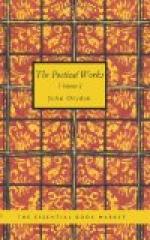If any one be so lamentable a critic as to require the smoothness, the numbers, and the turn of heroic poetry in this poem, I must tell him, that if he has not read Horace, I have studied him, and hope the style of his epistles is not ill imitated here. The expressions of a poem designed purely for instruction, ought to be plain and natural, and yet majestic: for here the poet is presumed to be a kind of lawgiver, and those three qualities which I have named, are proper to the legislative style. The florid, elevated, and figurative way is for the passions; for love and hatred, fear and anger, are begotten in the soul, by showing their objects out of their true proportion, either greater than the life or less: but instruction is to be given by showing them what they naturally are. A man is to be cheated into passion, but to be reasoned into truth.
* * * * *
Dim as the borrow’d beams of moon
and stars
To lonely, weary, wandering travellers,
Is reason to the soul: and as on
high,
Those rolling fires discover but the sky,
Not light us here; so reason’s glimmering
ray
Was lent, not to assure our doubtful way,
But guide us upward to a better day.
And as those nightly tapers disappear
When day’s bright lord ascends our
hemisphere;
So pale grows reason at religion’s
sight; 10
So dies, and so dissolves in supernatural
light.
Some few, whose lamp shone brighter, have
been led
From cause to cause, to nature’s
secret head;
And found that one first principle must
be:
But what, or who, that UNIVERSAL HE:
Whether some soul encompassing this ball,
Unmade, unmoved; yet making, moving all;
Or various atoms’ interfering dance
Leap’d into form, the noble work
of chance;
Or this Great All was from eternity;
20
Not even the Stagyrite himself could see;
And Epicurus guess’d as well as
he:
As blindly groped they for a future state;
As rashly judged of providence and fate:
But least of all could their endeavours
find
What most concern’d the good of
human kind:
For happiness was never to be found,
But vanish’d from them like enchanted
ground.
One thought Content the good to be enjoy’d—
This every little accident destroy’d:
30
The wiser madmen did for Virtue toil—
A thorny, or at best a barren soil:
In Pleasure some their glutton souls would
steep;
But found their line too short, the well
too deep;
And leaky vessels which no bliss could
keep.
Thus anxious thoughts in endless circles
roll,
Without a centre where to fix the soul:
In this wild maze their vain endeavours
end:
How can the less the greater comprehend?
Or finite reason reach Infinity?
40
For what could fathom God were more than
He.




